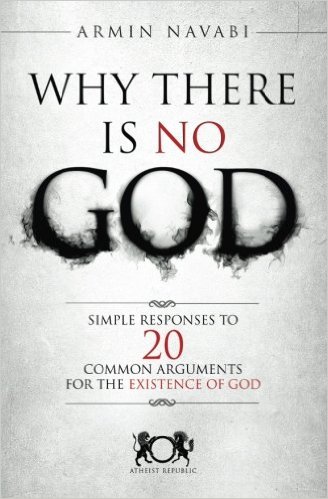- Paperback: ۱۲۸ pages
- Publisher: CreateSpace Independent Publishing Platform (October 6, 2014)
- Language: English
- ISBN-10: ۱۵۰۲۷۷۵۲۸X
- ISBN-13: ۹۷۸-۱۵۰۲۷۷۵۲۸۳
- Product Dimensions: ۵.۲ x 0.3 x 8 inches
- Shipping Weight: ۴ ounces (View shipping rates and policies)
- Average Customer Review: ۴.۴ out of 5 stars See all reviews (۷۲۴ customer reviews)
Why There Is No God: Simple Responses to 20 Common Arguments for the Existence of God
0 تومان
by Armin Navabi (Author), Nicki Hise (Editor)
• “Science can’t explain the complexity and order of life; God must have designed it to be this way.”
• “God’s existence is proven by scripture.”
• “There’s no evidence that God doesn’t exist.”
• “God has helped me so much. How could none of it be true?”
• “Atheism has killed more people than religion, so it must be wrong!”
How many times have you heard arguments like these for why God exists? Why There Is No God provides simple, easy-to-understand counterpoints to the most popular arguments made for the existence of God. Each chapter presents a concise explanation of the argument, followed by a response illustrating the problems and fallacies inherent in it. Whether you’re an atheist, a believer or undecided, this book offers a solid foundation for building your own inquiry about the concept of God.
محصولات مرتبط
?Why Evolution Is True
by Jerry A. Coyne
"Coyne's knowledge of evolutionary biology is prodigious, his deployment of it as masterful as his touch is light." -Richard Dawkins
In the current debate about creationism and intelligent design, there is an element of the controversy that is rarely mentioned-the evidence. Yet the proof of evolution by natural selection is vast, varied, and magnificent. In this succinct and accessible summary of the facts supporting the theory of natural selection, Jerry A. Coyne dispels common misunderstandings and fears about evolution and clearly confirms the scientific truth that supports this amazing process of change. Weaving together the many threads of modern work in genetics, paleontology, geology, molecular biology, and anatomy that demonstrate the "indelible stamp" of the processes first proposed by Darwin, Why Evolution Is True does not aim to prove creationism wrong. Rather, by using irrefutable evidence, it sets out to prove evolution right.
How to Clone a Mammoth: The Science of De-Extinction
by Beth Shapiro
Could extinct species, like mammoths and passenger pigeons, be brought back to life? The science says yes. In How to Clone a Mammoth, Beth Shapiro, evolutionary biologist and pioneer in "ancient DNA" research, walks readers through the astonishing and controversial process of de-extinction. From deciding which species should be restored, to sequencing their genomes, to anticipating how revived populations might be overseen in the wild, Shapiro vividly explores the extraordinary cutting-edge science that is being used--today--to resurrect the past. Journeying to far-flung Siberian locales in search of ice age bones and delving into her own research--as well as those of fellow experts such as Svante Paabo, George Church, and Craig Venter--Shapiro considers de-extinction's practical benefits and ethical challenges. Would de-extinction change the way we live? Is this really cloning? What are the costs and risks? And what is the ultimate goal?
Using DNA collected from remains as a genetic blueprint, scientists aim to engineer extinct traits--traits that evolved by natural selection over thousands of years--into living organisms. But rather than viewing de-extinction as a way to restore one particular species, Shapiro argues that the overarching goal should be the revitalization and stabilization of contemporary ecosystems. For example, elephants with genes modified to express mammoth traits could expand into the Arctic, re-establishing lost productivity to the tundra ecosystem.
Looking at the very real and compelling science behind an idea once seen as science fiction, How to Clone a Mammoth demonstrates how de-extinction will redefine conservation's future.
Quantum Enigma: Physics Encounters Consciousness 2nd Edition
by Bruce Rosenblum (Author), Fred Kuttner (Author)
In trying to understand the atom, physicists built quantum mechanics, the most successful theory in science and the basis of one-third of our economy. They found, to their embarrassment, that with their theory, physics encounters consciousness. Authors Bruce Rosenblum and Fred Kuttner explain all this in non-technical terms with help from some fanciful stories and anecdotes about the theory's developers. They present the quantum mystery honestly, emphasizing what is and what is not speculation. Quantum Enigma's description of the experimental quantum facts, and the quantum theory explaining them, is undisputed. Interpreting what it all means, however, is heatedly controversial. But every interpretation of quantum physics involves consciousness. Rosenblum and Kuttner therefore turn to exploring consciousness itself--and encounter quantum mechanics. Free will and anthropic principles become crucial issues, and the connection of consciousness with the cosmos suggested by some leading quantum cosmologists is mind-blowing. Readers are brought to a boundary where the particular expertise of physicists is no longer the only sure guide. They will find, instead, the facts and hints provided by quantum mechanics and the ability to speculate for themselves.
In the few decades since the Bell's theorem experiments established the existence of entanglement (Einstein's "spooky action"), interest in the foundations, and the mysteries, of quantum mechanics has accelerated. In recent years, physicists, philosophers, computer engineers, and even biologists have expanded our realization of the significance of quantum phenomena. This second edition includes such advances. The authors have also drawn on many responses from readers and instructors to improve the clarity of the book's explanations.
Seven Brief Lessons on Physics
by Carlo Rovelli
Look out for Carlo Rovelli's next book, Reality Is Not What It Seems.
Instant New York Times Bestseller
“One of the year’s most entrancing books about science.”—The Wall Street Journal
“Clear, elegant...a whirlwind tour of some of the biggest ideas in physics.”—The New York Times Book Review
This playful, entertaining, and mind-bending introduction to modern physics briskly explains Einstein's general relativity, quantum mechanics, elementary particles, gravity, black holes, the complex architecture of the universe, and the role humans play in this weird and wonderful world. Carlo Rovelli, a renowned theoretical physicist, is a delightfully poetic and philosophical scientific guide. He takes us to the frontiers of our knowledge: to the most minute reaches of the fabric of space, back to the origins of the cosmos, and into the workings of our minds. The book celebrates the joy of discovery. “Here, on the edge of what we know, in contact with the ocean of the unknown, shines the mystery and the beauty of the world,” Rovelli writes. “And it’s breathtaking.”
Stealing from God: Why Atheists Need God to Make Their Case
by Frank Turek (Author), Ravi Zacharias (Foreword)
If you think atheists have reason, evidence, and science on their side, think again! Award-winning author Dr. Frank Turek (I Don’t Have Enough Faith to be an Atheist) will show you how atheists steal reason, evidence, science, and other arguments from God in trying to make their case for atheism. If that sounds contradictory, it’s because it is! Atheists can’t make their case without appealing to realities only theism can explain. In an engaging and memorable way, Stealing from God exposes these intellectual crimes atheists are committing and then provides four powerful reasons for why Christianity is true.
The Black Hole War: My Battle with Stephen Hawking to Make the World Safe for Quantum Mechanics
by Leonard Susskind
At the beginning of the 21st century, physics is being driven to very unfamiliar territory--the domain of the incredibly small and the incredibly heavy. The new world is a world in which both quantum mechanics and gravity are equally important. But mysteries remain. One of the biggest involved black holes. Famed physicist Stephen Hawking claimed that anything sucked in a black hole was lost forever. For three decades, Leonard Susskind and Hawking clashed over the answer to this problem. Finally, in 2004, Hawking conceded.
THE BLACK HOLE WAR will explain the mind-blowing science that finally won out, and the emergence of a new paradigm that argues the world--this catalog, your home, your breakfast, you--is actually a hologram projected from the edges of space.
The End of Faith: Religion, Terror, and the Future of Reason
by Sam Harris
"The End of Faith articulates the dangers and absurdities of organized religion so fiercely and so fearlessly that I felt relieved as I read it, vindicated....Harris writes what a sizable number of us think, but few are willing to say."―Natalie Angier, ?New York Times
In ?The End of Faith?, Sam Harris delivers a startling analysis of the clash between reason and religion in the modern world. He offers a vivid, historical tour of our willingness to suspend reason in favor of religious beliefs―even when these beliefs inspire the worst human atrocities. While warning against the encroachment of organized religion into world politics, Harris draws on insights from neuroscience, philosophy, and Eastern mysticism to deliver a call for a truly modern foundation for ethics and spirituality that is both secular and humanistic. Winner of the 2005 PEN/Martha Albrand Award for Nonfiction.
The Golden Ratio: The Story of PHI, the World’s Most Astonishing Number
by Mario Livio
Throughout history, thinkers from mathematicians to theologians have pondered the mysterious relationship between numbers and the nature of reality. In this fascinating book, Mario Livio tells the tale of a number at the heart of that mystery: phi, or 1.6180339887...This curious mathematical relationship, widely known as "The Golden Ratio," was discovered by Euclid more than two thousand years ago because of its crucial role in the construction of the pentagram, to which magical properties had been attributed. Since then it has shown a propensity to appear in the most astonishing variety of places, from mollusk shells, sunflower florets, and rose petals to the shape of the galaxy. Psychological studies have investigated whether the Golden Ratio is the most aesthetically pleasing proportion extant, and it has been asserted that the creators of the Pyramids and the Parthenon employed it. It is believed to feature in works of art from Leonardo da Vinci's Mona Lisa to Salvador Dali's The Sacrament of the Last Supper, and poets and composers have used it in their works. It has even been found to be connected to the behavior of the stock market!
The Golden Ratio is a captivating journey through art and architecture, botany and biology, physics and mathematics. It tells the human story of numerous phi-fixated individuals, including the followers of Pythagoras who believed that this proportion revealed the hand of God; astronomer Johannes Kepler, who saw phi as the greatest treasure of geometry; such Renaissance thinkers as mathematician Leonardo Fibonacci of Pisa; and such masters of the modern world as Goethe, Cezanne, Bartok, and physicist Roger Penrose. Wherever his quest for the meaning of phi takes him, Mario Livio reveals the world as a place where order, beauty, and eternal mystery will always coexist.
The Greatest Show on Earth: The Evidence for Evolution
by Richard Dawkins
Richard Dawkins transformed our view of God in his blockbuster, The God Delusion, which sold more than 2 million copies in English alone. He revolutionized the way we see natural selection in the seminal bestseller The Selfish Gene. Now, he launches a fierce counterattack against proponents of "Intelligent Design" in his New York Times bestseller, The Greatest Show on Earth.
"Intelligent Design" is being taught in our schools; educators are being asked to "teach the controversy" behind evolutionary theory. There is no controversy. Dawkins sifts through rich layers of scientific evidence—from living examples of natural selection to clues in the fossil record; from natural clocks that mark the vast epochs wherein evolution ran its course to the intricacies of developing embryos; from plate tectonics to molecular genetics—to make the airtight case that "we find ourselves perched on one tiny twig in the midst of a blossoming and flourishing tree of life and it is no accident, but the direct consequence of evolution by non-random selection." His unjaded passion for the natural world turns what might have been a negative argument, exposing the absurdities of the creationist position, into a positive offering to the reader: nothing less than a master’s vision of life, in all its splendor.
The Innovators: How a Group of Hackers, Geniuses, and Geeks Created the Digital Revolution
by Walter Isaacson
Following his blockbuster biography of Steve Jobs, Walter Isaacson’s New York Times bestselling and critically acclaimed The Innovators is a “riveting, propulsive, and at times deeply moving” (The Atlantic) story of the people who created the computer and the Internet.
What were the talents that allowed certain inventors and entrepreneurs to turn their visionary ideas into disruptive realities? What led to their creative leaps? Why did some succeed and others fail?
The Innovators is a masterly saga of collaborative genius destined to be the standard history of the digital revolution—and an indispensable guide to how innovation really happens. Isaacson begins the adventure with Ada Lovelace, Lord Byron’s daughter, who pioneered computer programming in the 1840s. He explores the fascinating personalities that created our current digital revolution, such as Vannevar Bush, Alan Turing, John von Neumann, J.C.R. Licklider, Doug Engelbart, Robert Noyce, Bill Gates, Steve Wozniak, Steve Jobs, Tim Berners-Lee, and Larry Page.
This is the story of how their minds worked and what made them so inventive. It’s also a narrative of how their ability to collaborate and master the art of teamwork made them even more creative. For an era that seeks to foster innovation, creativity, and teamwork, The Innovators is “a sweeping and surprisingly tenderhearted history of the digital age” (The New York Times).
The Smartest Kids in the World: And How They Got That Way
by Amanda Ripley
How do other countries create “smarter” kids? What is it like to be a child in the world’s new education superpowers? The Smartest Kids in the World “gets well beneath the glossy surfaces of these foreign cultures and manages to make our own culture look newly strange....The question is whether the startling perspective provided by this masterly book can also generate the will to make changes” (The New York Times Book Review).
In a handful of nations, virtually all children are learning to make complex arguments and solve problems they’ve never seen before. They are learning to think, in other words, and to thrive in the modern economy. Inspired to find answers for our own children, author and Time magazine journalist Amanda Ripley follows three Americans embedded in these countries for one year. Kim, fifteen, raises $10,000 so she can move from Oklahoma to Finland; Eric, eighteen, trades his high-achieving Minnesota suburb for a booming city in South Korea; and Tom, seventeen, leaves a historic Pennsylvania village for Poland.
Through these young informants, Ripley meets battle-scarred reformers, sleep-deprived zombie students, and a teacher who earns $4 million a year. Their stories, along with groundbreaking research into learning in other cultures, reveal a pattern of startling transformation: none of these countries had many “smart” kids a few decades ago. Things had changed. Teaching had become more rigorous; parents had focused on things that mattered; and children had bought into the promise of education.
What If?: Serious Scientific Answers to Absurd Hypothetical Questions
by Randall Munroe
From the creator of the wildly popular webcomic xkcd, hilarious and informative answers to important questions you probably never thought to ask.
Millions of people visit xkcd.com each week to read Randall Munroe’s iconic webcomic. His stick-figure drawings about science, technology, language, and love have a large and passionate following.
Fans of xkcd ask Munroe a lot of strange questions. What if you tried to hit a baseball pitched at 90 percent the speed of light? How fast can you hit a speed bump while driving and live? If there was a robot apocalypse, how long would humanity last?
In pursuit of answers, Munroe runs computer simulations, pores over stacks of declassified military research memos, solves differential equations, and consults with nuclear reactor operators. His responses are masterpieces of clarity and hilarity, complemented by signature xkcd comics. They often predict the complete annihilation of humankind, or at least a really big explosion.
The book features new and never-before-answered questions, along with updated and expanded versions of the most popular answers from the xkcd website. What If? will be required reading for xkcd fans and anyone who loves to ponder the hypothetical.





























نقد و بررسیها
هنوز بررسیای ثبت نشده است.